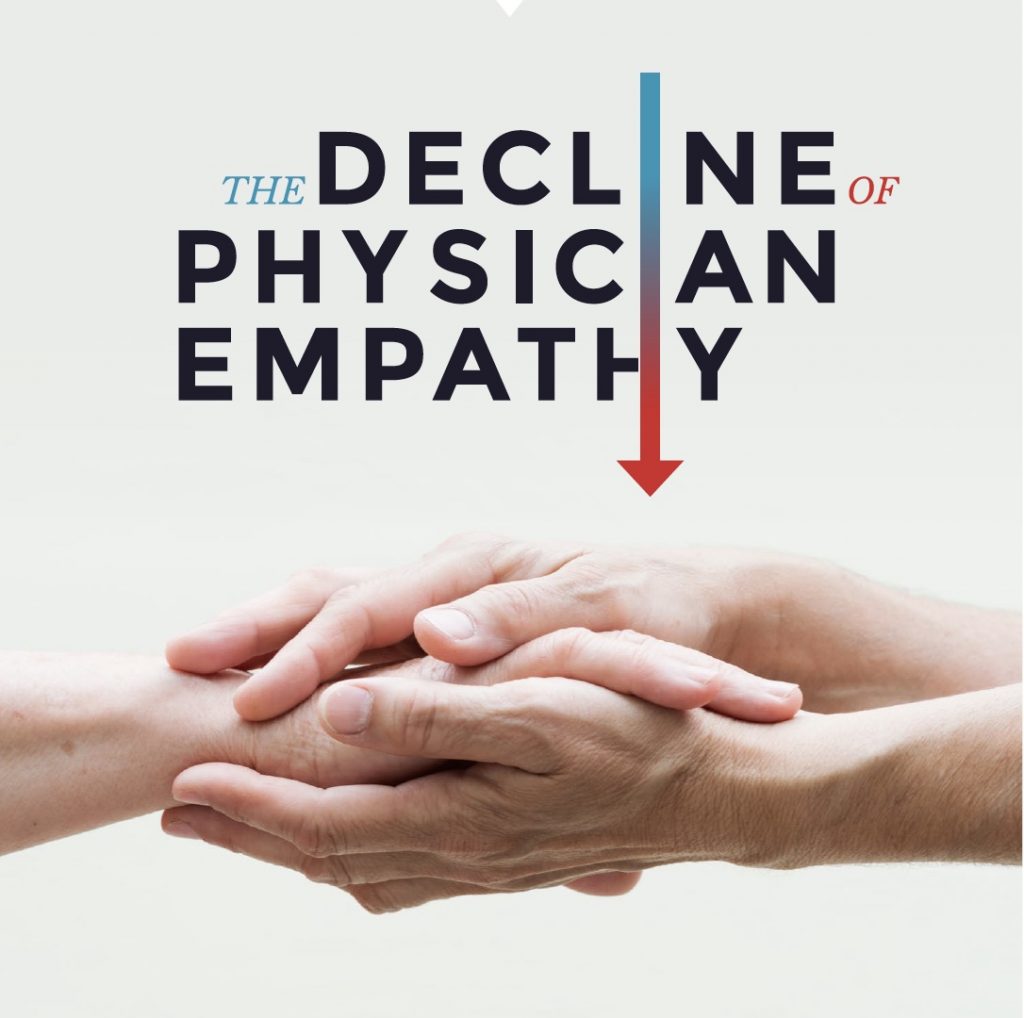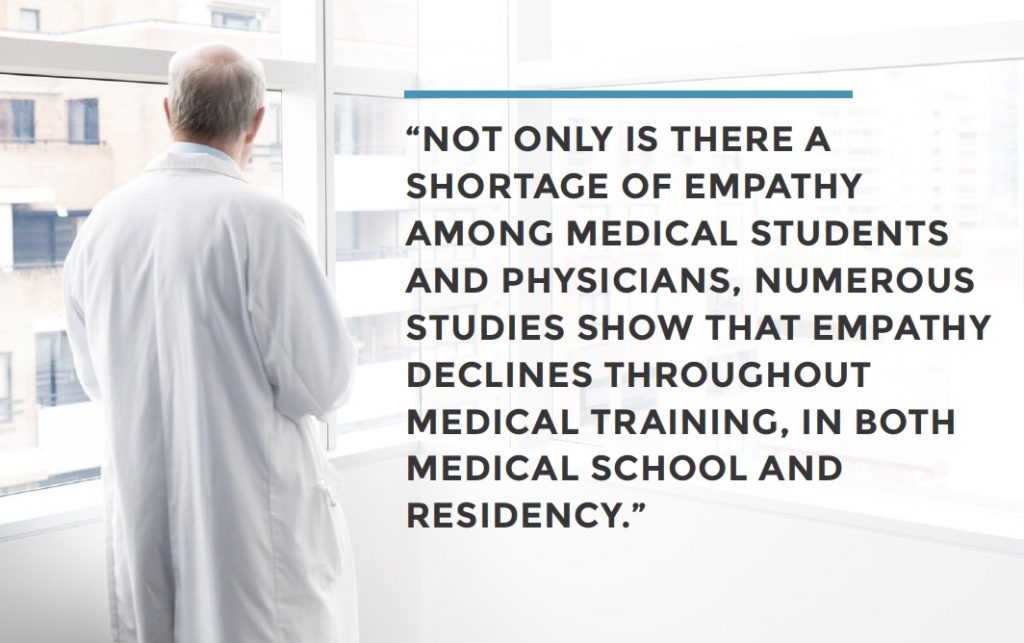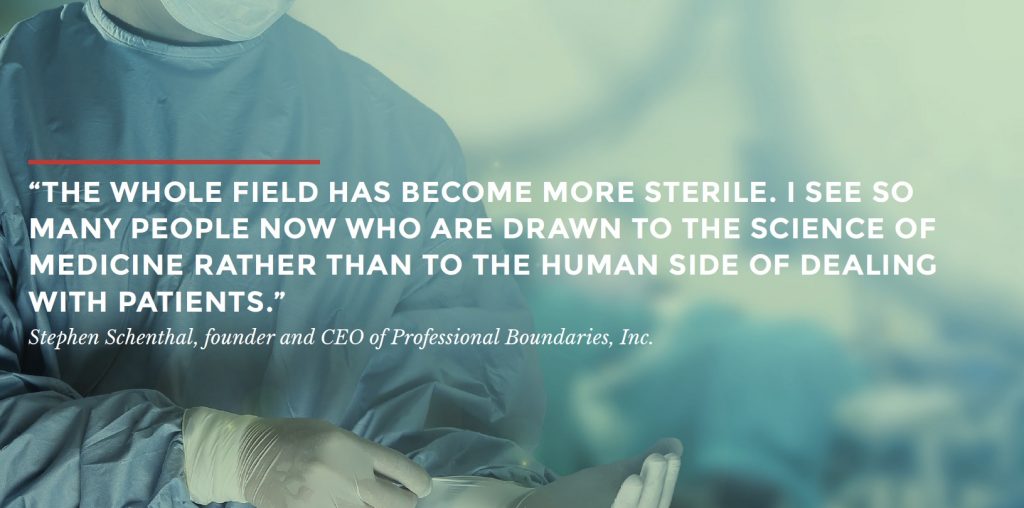The Decline of Physician Empathy
The Decline of Physician Empathy

As part of the modern version of the Hippocratic Oath, adopted by the World Medical Association in 1948, physicians swear to “remember that there is art to medicine as well as science, and that warmth, sympathy, and understanding may outweigh the surgeon’s knife or the chemist’s drug.” More recently, voluminous research has demonstrated the wisdom of that injunction. One recent article, sums up the benefits of physician empathy this way:
“Physician empathy has been associated with higher levels of patient satisfaction, adherence to medical recommendations or regimens, and improved clinical outcomes. Moreover, empathy appears to positively influence physicians themselves, as empathy has been linked to lower burnout, higher well-being, higher ratings of clinical competence, and less medical-legal risk. Physician empathy may even reduce health care costs, as patient centered communication styles have been associated with lower diagnostic test expenditures.”
Research related to physician empathy (and clinician empathy in general) has exploded in recent years. The article just mentioned cites more than a hundred books and peer-reviewed articles on virtually every facet of the subject, almost all of which were published in the past 15 years.
Underlying all these studies is a growing concern that empathy has been leeching out of medicine for some time. As one author puts it, “Not only is there a shortage of empathy among medical students and physicians, numerous studies show that empathy declines throughout medical training, in both medical school and residency.” And other studies show that the capacity for empathy does not increase as practitioners gain experience. In fact, a 2014 study involving doctors from several different specialty areas showed that the longer physicians were in practice, the more likely they were to underestimate patient pain levels. Several forces have been driving this erosion of empathy. Perhaps the most obvious is the way doctors have been trained. Until fairly recently, medical students were taught to avoid any emotions that might cloud their judgment. The unquestioned assumption was that personal feelings endangered clinicians’ objectivity.

Other factors have also played a role. Several studies have found, for instance, that medical students’ empathy drops precipitously when they start seeing patients in their third year. Part of the reason is surely self-defense against the onslaught of emotions that comes from dealing with people in pain. The high level of stress among third-year students is also a contributor. As Jean Decety, a neuroscientist at the University of Chicago and an expert on empathy noted in a 2015 article, “Stress plays a role in diminishing our ability to keep the self/other distinction at an optimum, healthy level. Studies demonstrate that stress and the hormones secreted when we are stressed not only alter brain function, but also disrupt emotional empathy.”
The explosion of diagnostic technology is yet another factor in the decline of empathy. “A lot of older, really good internal medicine doctors bemoan the loss of physicians’ ability to use the physical examination as a diagnostic process,” says Peter Graham, co-founder of Acumen Assessments and Acumen Institute and a specialist at assessing and treating professionals. “So many doctors now are so dependent on lab tests to do a differential diagnosis, they can’t diagnose a patient just by interviewing them and examining their body,” he explains. “All of which distances the doctor from the patient and from the act of empathizing in the course of the physical exam.”

The emphasis on technology also tends to attract different people to medicine, says Stephen Schenthal, founder and CEO of Professional Boundaries, Inc. (PBI). “It used to be said that medicine is 90% art and 10% science,” he notes. “But over the years, as medicine has tended to reverse that ratio, the whole field has become more sterile. I see so many people now who are drawn to the science of medicine rather than to the human side of dealing with patients.”
According to Graham, the whole culture of medicine began shifting in the 60s and 70s. Before that, medicine “was really not a money-generating career,” he points out. But after that, “Medicine became not only a money-making career for physicians, but it also became a stock-market industry, as well” (currently valued at more than $4 trillion). And like all corporate enterprises, today’s healthcare establishment seeks to increase productivity, which for clinicians generally means less time with patients and less time for empathy.
Those who struggle to maintain an emotional connection with patients despite the challenges risk compassion fatigue. “When the work load is heavy and there’s not enough time to address all the issues that are occurring,” says Funmilayo Rachal, a board certified adult and forensic psychiatrist, “a physician can definitely get overwhelmed and develop burnout.” Others retreat behind a wall of professional aloofness to avoid being overwhelmed.
Ironically, the same corporate mentality that impedes empathy is also fueling a resurgence of interest in how clinicians can better relate to patients. Empathy, it turns out, is good for business. As noted at the outset, physician empathy boosts patient compliance, improved outcomes and patient satisfaction—all considered “key performance indicators” at the corporate level.
Caught in the middle—between the empathy-dampening demand for productivity and the business-driven interest in increasing empathy—are physicians, nurses and all the other medical professionals trying to care for patients in the world of 21st-century health care.
